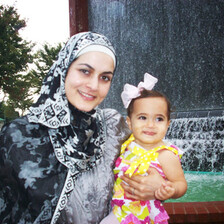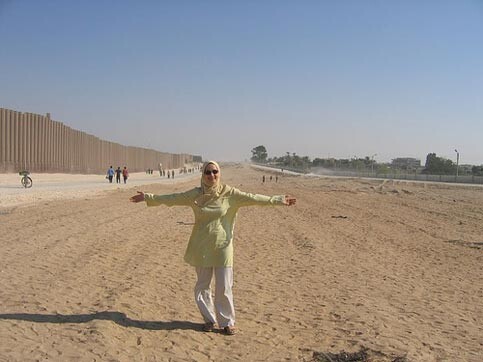
THE DEAD ZONE — Me, standing in the once deadly and impervious Philadelphi Corridor, beween Egyptian and Palestinain Rafah, where Israeli tanks would nest and go out through the iron wall to the left of this photo during offensives on the refugee camp.
Yesterday, I joined thousands of Palestinians who streamed across the once impermeable and deadly wall that divided this battered border town into two, to visit family and friends they had not seen in decades, to shop, or simply to see Egypt for the first time.
It was yet another journey into the surreal. There I was, after all, standing in the Dead Zone known as Philadelphi corridor by Israelis, the killing field by Palestinians, the very location where Israeli tanks once nested awaiting orders to pound this refugee camp, their tracks still imprinted in the sand, the Palestinian homes they destroyed spread out like carcasses in the background. The once deadly frontline of the Israeli army had become a porous free-for-all.
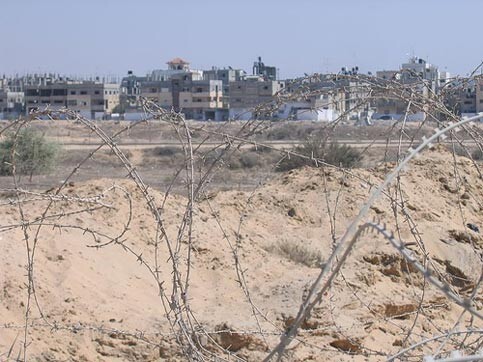
VIEW FROM THE OTHER SIDE — A view of the battered town of Rafah from the barbed wire-woven Philadelphi corridor.
Rafah was divided into two parts by a fence - and later an iron wall - under the 1982 peace treaty between and Egypt and Israel, which returned the occupied Sinai Peninsula to Egypt.
Thousands of Palestinian families were separated as a result.
The Israeli withdrawal has given them the brief opportunity to reunite, many for the first time in decades, as they clambered over and through the barriers, overcome with emotion.
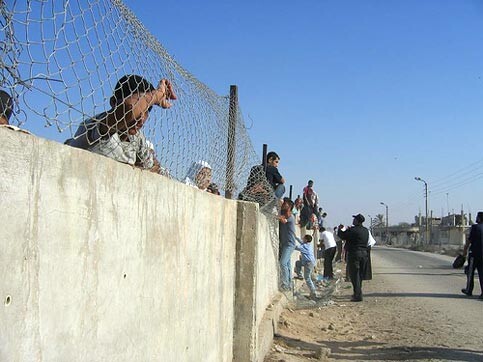
BEYOND THE WALL — Palestinians and Egyptians clamoring to cross the wall separating them from each other.
“How are you?! How is the family? I missed you all so much,” cried one man, Ibrahim Turbani, to a cousin he had not seen in 28 years from the Palestinian side, as they hugged in the middle of the sandy no-man’s land where Israeli tanks once nested.
The scenes were repeated all along the border area, with tearful and emotional reunions between mothers and daughters, brothers and cousins.

WEEKEND TRIP — Palestinians crossing over into Egypt.
Some Palestinians simply went as first-time tourists, curious to find out what was outside of their war-torn Gaza Strip.
“I came to see this other world I heard about, I’ve never left Gaza in my life, in fact I’ve barely left my refugee camp, and this was my opportunity to do so,” said 20-year-old Sameera Gashlan, a nursing student in a Gaza university and resident of the Nseirat refugee camp in central Gaza.
Nearby, two small boys from the formerly besieged Rafah neighbourhood of Tal al-Sultan whispered and pointed out people from behind a blown-off portion of the wall, as they tried to identify who was Egyptian and who was Palestinian.
“See, I told you silly, that’s a Palestinian, not an Egyptian,” said one to the other.
“Its something new for them, they’ve never seen people others than Gazans in their life,” one young man explained.
Many Gazans were re-united with their families that they were otherwise unable to visit in years past due to Israeli restrictions on travel that have prevented some 90% of Palestinians from leaving Gaza.
“I’m going to see meet my mother, who is very ill, in Al-Areesh and try and bring her back to Gaza,” explained Saleh Areef, who has been unable to leave Gaza since 1999.
“I left Kuwait to come live in Gaza, but the Israelis froze the family reunion and residency permits after I arrived and I’ve been a prisoner in my own land ever since.”
Palestinians were critical of the calls to seal off the border again, saying Rafah was once one town and should remain that way, and citing as the real problem the lack of a systemic means of access out of and into the Gaza Strip.
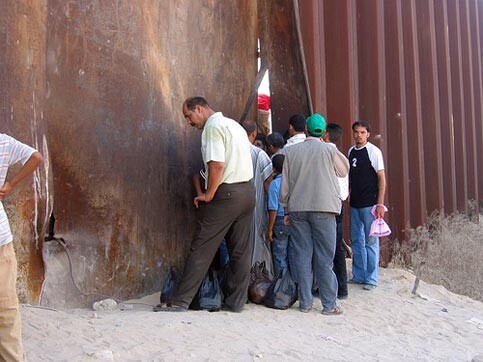
IN WE GO — Palestinians crossing through to Egypt.
“If they just opened Rafah as an international border with normalized access for Palestinians then there would be no reason for all of this madness,” one Palestinian woman told me.
“The reason people are flooding the border is that they aren’t allowed through in a normalized way, there is no system to allow that kind of access. They have families and they are going to want to cross. The bigger problem is ensuring there is a normalized procedure to cross the border.”
The Rafah border terminal, which Israeli forces have vacated but still control, was shut down indefinitely last week, leaving 1.5 million Palestinians in Gaza stranded.
The unofficial-and illegal- border passages have been their only means to leave or enter Gaza in the meantime.
Amidst the surreal scenes that to the untrained eye seemed like a mass exodus of refugees, Palestinians herded goats and sheep they had bought for a fraction of the price in the Egyptian town of al-Arish, after first hauling them over a part of the border fence.

SNEAKING A PEEK — Unthinkable a few days ago, young Palestinain boys from Rafah take a peek over a wall dividing them from Egypt.
Egyptian visitors to Palestinian Rafah-and Gaza city, of which there were thousands - carried back bags of apples - a staple of northern Gaza, but difficult to find and expensive in Egypt, along with wool blankets and trays of sweets, as moneychangers took advantage of the unexpected market, exchanging shekels for pounds at high rates to anxious visitors, and vice versa.
“Who would have ever believed it-there were actually Egyptians in my store this morning-in Gaza city!” a Palestinian boutique owner, downstairs from my house, exclaimed.
“I wish the border would never close-business has never been so good, and people can finally visit their families,” said Egyptian shopkeeper Mohamamd Gumbaz, who owns a herb and spice store just after the border that, like many nearby shops, had sold out of most items.
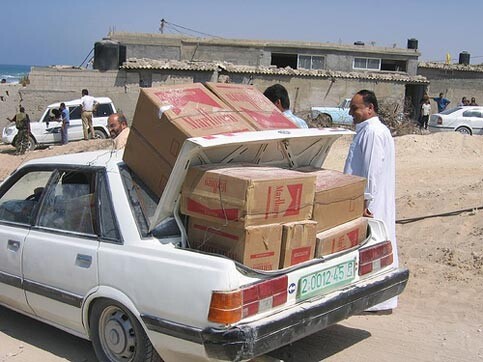
DUTY FREE SHOPPING — Some Palestinians took advantage of the porous border to smuggle across cheap cigarettes without any added taxes.
Despite the intoxicating festivity, several Israeli drones whirred menacingly overhead the Palestinian side of Rafah, creating a cacophonous, if not disturbing, symphony with nearby celebratory wedding drums and the baahing of newly purchased Egyptian sheep.
They monitored the movement along the border from afar, serving as an eerie and foreboding reminder that Israeli troops were never far away for residents of this battered town.
“They’re never going to leave us alone,”said one young Rafah resident, whose home had been demolished and brother killed, during one of the deadly Israeli offensives into the area.
“They will continue to make our lives miserable, if not with tanks, then with unmanned drones.”
Laila M. El-Haddad is a journalist based in the Gaza Strip.


